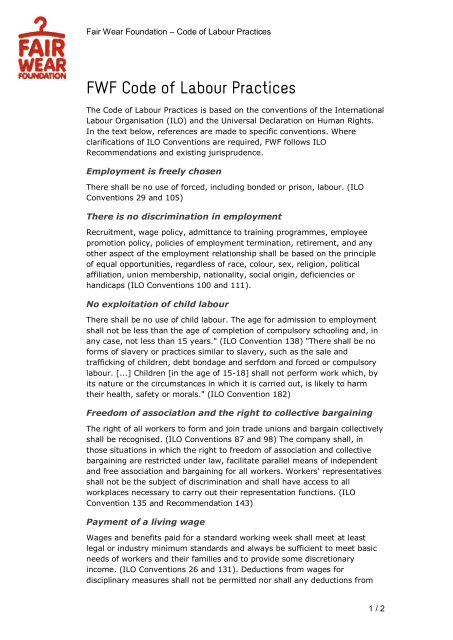FWF Code of Labour Practices - Fair Wear Foundation
FWF Code of Labour Practices - Fair Wear Foundation
FWF Code of Labour Practices - Fair Wear Foundation
Create successful ePaper yourself
Turn your PDF publications into a flip-book with our unique Google optimized e-Paper software.
<strong>Fair</strong> <strong>Wear</strong> <strong>Foundation</strong> – <strong>Code</strong> <strong>of</strong> <strong>Labour</strong> <strong>Practices</strong><br />
<strong>FWF</strong> <strong>Code</strong> <strong>of</strong> <strong>Labour</strong> <strong>Practices</strong><br />
The <strong>Code</strong> <strong>of</strong> <strong>Labour</strong> <strong>Practices</strong> is based on the conventions <strong>of</strong> the International<br />
<strong>Labour</strong> Organisation (ILO) and the Universal Declaration on Human Rights.<br />
In the text below, references are made to specific conventions. Where<br />
clarifications <strong>of</strong> ILO Conventions are required, <strong>FWF</strong> follows ILO<br />
Recommendations and existing jurisprudence.<br />
Employment is freely chosen<br />
There shall be no use <strong>of</strong> forced, including bonded or prison, labour. (ILO<br />
Conventions 29 and 105)<br />
There is no discrimination in employment<br />
Recruitment, wage policy, admittance to training programmes, employee<br />
promotion policy, policies <strong>of</strong> employment termination, retirement, and any<br />
other aspect <strong>of</strong> the employment relationship shall be based on the principle<br />
<strong>of</strong> equal opportunities, regardless <strong>of</strong> race, colour, sex, religion, political<br />
affiliation, union membership, nationality, social origin, deficiencies or<br />
handicaps (ILO Conventions 100 and 111).<br />
No exploitation <strong>of</strong> child labour<br />
There shall be no use <strong>of</strong> child labour. The age for admission to employment<br />
shall not be less than the age <strong>of</strong> completion <strong>of</strong> compulsory schooling and, in<br />
any case, not less than 15 years." (ILO Convention 138) "There shall be no<br />
forms <strong>of</strong> slavery or practices similar to slavery, such as the sale and<br />
trafficking <strong>of</strong> children, debt bondage and serfdom and forced or compulsory<br />
labour. [...] Children [in the age <strong>of</strong> 15-18] shall not perform work which, by<br />
its nature or the circumstances in which it is carried out, is likely to harm<br />
their health, safety or morals." (ILO Convention 182)<br />
Freedom <strong>of</strong> association and the right to collective bargaining<br />
The right <strong>of</strong> all workers to form and join trade unions and bargain collectively<br />
shall be recognised. (ILO Conventions 87 and 98) The company shall, in<br />
those situations in which the right to freedom <strong>of</strong> association and collective<br />
bargaining are restricted under law, facilitate parallel means <strong>of</strong> independent<br />
and free association and bargaining for all workers. Workers' representatives<br />
shall not be the subject <strong>of</strong> discrimination and shall have access to all<br />
workplaces necessary to carry out their representation functions. (ILO<br />
Convention 135 and Recommendation 143)<br />
Payment <strong>of</strong> a living wage<br />
Wages and benefits paid for a standard working week shall meet at least<br />
legal or industry minimum standards and always be sufficient to meet basic<br />
needs <strong>of</strong> workers and their families and to provide some discretionary<br />
income. (ILO Conventions 26 and 131). Deductions from wages for<br />
disciplinary measures shall not be permitted nor shall any deductions from<br />
1 / 2
<strong>Fair</strong> <strong>Wear</strong> <strong>Foundation</strong> – <strong>Code</strong> <strong>of</strong> <strong>Labour</strong> <strong>Practices</strong><br />
wages not provided for by national law be permitted. Deductions shall never<br />
constitute an amount that will lead the employee to receive less than the<br />
minimum wage. Employees shall be adequately and clearly informed about<br />
the specifications <strong>of</strong> their wages including wage rates and pay period.<br />
No excessive working hours<br />
Hours <strong>of</strong> work shall comply with applicable laws and industry standards. In<br />
any event, workers shall not on a regular basis be required to work in excess<br />
<strong>of</strong> 48 hours per week and shall be provided with at least one day <strong>of</strong>f for<br />
every seven-day period. Overtime shall be voluntary, shall not exceed 12<br />
hours per week, shall not be demanded on a regular basis and shall always<br />
be compensated at a premium rate. (ILO Convention 1)<br />
Safe and healthy working conditions<br />
A safe and hygienic working environment shall be provided, and best<br />
occupational health and safety practice shall be promoted, bearing in mind<br />
the prevailing knowledge <strong>of</strong> the industry and <strong>of</strong> any specific hazards.<br />
Appropriate attention shall be paid to occupational hazards specific to this<br />
branch <strong>of</strong> the industry and assure that a safe and hygienic work environment<br />
is provided for. Effective regulations shall be implemented to prevent<br />
accidents and minimise health risks as much as possible (following ILO<br />
Convention 155). Physical abuse, threats <strong>of</strong> physical abuse, unusual<br />
punishments or discipline, sexual and other harassment, and intimidation by<br />
the employer is strictly prohibited.<br />
Legally-binding employment relationship<br />
Obligations to employees under labour or social security laws and regulations<br />
arising from the regular employment relationship shall not be avoided<br />
through the use <strong>of</strong> labour-only contracting arrangements, or through<br />
apprenticeship schemes where there is no real intent to impart skills or<br />
provide regular employment. Younger workers shall be given the opportunity<br />
to participate in education and training programmes.<br />
2 / 2









